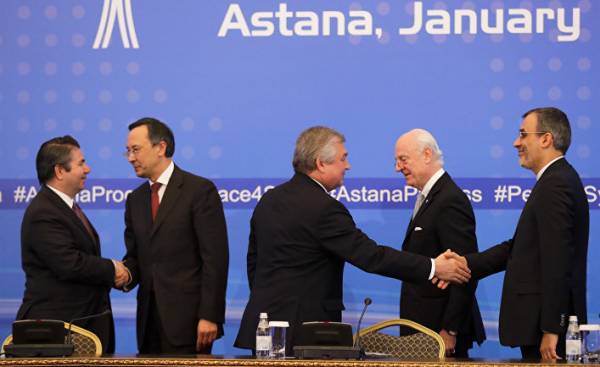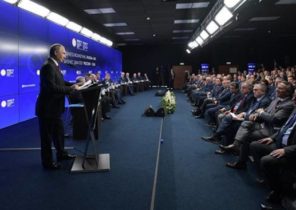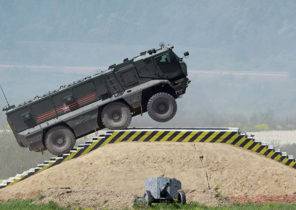
The truce at the end of last year in Syria on the basis of agreements between Russia, Iran and Turkey, was yet another diplomatic victory for Moscow in the middle East. It is unclear whether this initiative is any more successful than previous peace agreements — their life was short-lived. But the most remarkable aspect of this diplomatic gambit that the agreements are not involved, the U.S. and its traditional partners in the Arab world: Saudi Arabia, Egypt, Jordan, UAE and Qatar. Some experts proclaim diplomatic and military success of Moscow in the middle East a new era of Russian domination in the region, as Donald trump during the presidential debate said that Russia is now “dominates in the middle East”.
But not so simple. Many predictions about the Russian military campaign in Syria failed to materialize: Moscow has not suffered significant human and material losses and not (yet) bogged down in this war. The Kremlin believes the campaign is very successful and no doubt very pleased that the United States is excluded from the new peace agreements.
In the two decades after the cold war Russia had to settle for in the middle East the role of the observer, while America was fighting in Iraq, toppled Moammar Gaddafi, has led the fight against “Islamic state” (banned in Russia) and the decision of such problems as the Iranian nuclear program, the Israeli-Palestinian conflict and the unrest in Arab countries. But Syria suddenly has reinforced the status of Russia as a great power in military and diplomatic sense.
Another year and a half ago it seemed that the regime of Bashar al-Assad is on the verge of collapse. Today, he intends to regain control over all the major cities of Western Syria. Putin managed simultaneously to improve relations with Israel, Saudi Arabia, Turkey and Iran and strike at the liberal interventionist plans of “regime change”. USA against this background, some helpless giant.
Undoubtedly, the Kremlin is very successfully played the Syrian card. However, the idea that Russia is now going to replace the U.S.’s role as a leading external power in the middle East, is hardly justified. First, the current success is partly due to the restraint of the ambitions of Moscow and the recognition of the limitations of Russian influence outside Syria. Moscow sells arms willing and ready to act opportunistically for the sake of expanding its influence, but does not intend to take the solution to the problems of the region and American commitments in the security sphere. For Russia a higher priority have other regions — the Western and the southern near abroad, and Asia-Pacific markets.
Secondly, even if Moscow’s ambitions will increase over time, the potential of Russian intervention is limited. Russia has a fairly grim long-term economic prospects, given the corruption, dependence on commodity exports, demographic decline, sanctions and unfavorable business climate. Russia has no oceanic fleet that can replace the Fifth fleet of the U.S. Navy, which now prevails in the Persian Gulf. Naval base in Tartus and Latakia air base in the only Russian military facilities outside the former Soviet Union. This is an important support for Russia in the Eastern Mediterranean, and expanding their presence on these bases, Moscow will be able to deliver a lot of concern to American warships. But this does not pose a threat to American dominance in the Mediterranean, especially if Turkey remains in NATO and the US Sixth fleet will be able to operate in the Mediterranean sea, based in the ports of the region.
Thirdly, Syria is a unique case. There Russia has shown that it is ready for large-scale use of force until the destruction of the cities, but it is unlikely this tactic will be ready to accept other countries in the region, even the most authoritarian. On the contrary, the ability to more subtle surgical intervention (such as the us operation to eliminate bin Laden) Russia is not demonstrated. In addition, Moscow has longstanding ties with Syria, which took decades, but in relations with other States in the Middle East it is still a very valid point, starting from specific transactions. The Kremlin’s willingness to limited tactical alliances with a wide range of weakly compatible partners explains how Russia manages to simultaneously coordinate their actions with Syria, Israel, Iran and Hezbollah. But this approach prevents build long-term partnership.
Saudi Arabia and some other monarchies of the Persian Gulf will continue to flirt with Moscow and, probably, to buy Russian weapons. But Russia’s influence on the Gulf countries will be limited due to the fact that Moscow supports the Assad regime, and relations with Iran, and most importantly — due to the ancient ties to the Arab monarchies with the United States. Serious improvement in Russian-Iranian relations also unlikely, given their centuries-long mutual hostility, not the same challenges in Syria and Central Asia, and also the competition on the energy market.
Russia has enough allies and influence to achieve strong positions in Iraq. Moscow’s relations with the Egyptian military is probably limited to the supply of arms in view of military cooperation Cairo with Washington and the lack of Russian resources to solve the economic problems of Egypt. Russia has good relations with Israel, but, again, their tasks are not the same, especially if Russia will continue to cooperate in Syria with Iran and Hezbollah. The Israeli secret services and the military is ready to strengthen ties with Moscow, but do not intend to abandon key partnerships with the United States.
Russian-Turkish relations is improved: Moscow and Ankara to coordinate its actions in Syria, Turkey has so persistently requires the displacement of Assad and has limited support for multiple rebel groups, and Russia helped to stop the advance of the Kurdish units in Syria. But the interests of Turkey and Russia are not the same in Syria, so Ankara will have to continue to balance relations with Moscow, on the one hand, and membership in NATO and partnership with the United States on the other.
Fourth, it is still unknown how long will be the success of Russia in Syria. Moscow, it seems, will not be able to emerge from this conflict without at least relative political settlement. But this is unlikely to be done quickly. The breakthrough of the “Islamic state” (banned in Russia as a terrorist organization) in Palmyra tells about chronic the less set the Syrian army. And even if Assad manages to win some sort of military victory, it will be Pyrrhic. Hard to imagine that NATO, the Gulf countries and international financial institutions undertake to Finance the reconstruction of Syria without a political solution, endorsed by the UN. But if these costs would be borne by Moscow, is unlikely to suit Russian citizens.
Finally, there is a risk that Russian intervention in the middle East would provoke a reaction. Take Aleppo for the Kremlin not only a major military victory, but a blow to the reputation. An endless US military operations in the middle East made Washington the main “far enemy” jihadists. But the footage from Aleppo indicate that their mood may change. About 12-14% of Russia’s population are Muslims, and, as stated last year, the Minister of foreign Affairs of Russia Sergey Lavrov, about the spirit of thousands of Russian citizens are fighting in Syria on the side of ISIS. In October 2015, ISIS has shot down a Russian airliner over the Sinai Peninsula, and in December in Turkey in retaliation for Aleppo was killed by the Russian Ambassador. This may be only the beginning.
Russia has returned to the middle East and is ready to use military force to diplomatic success. The new us administration will need much closer study of the action of Moscow in the region. However, to paraphrase Mark TWAIN, the fears of Russian domination in the middle East are greatly exaggerated.







